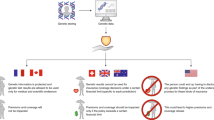Conclusion
The economic costs to the insurers of complementary routine genetic testing would outweigh the benefits. However, should testing technology in future be refined so as to produce a cheap and reliable test, there is no reason why insurers might not take up predictive testing as part of the normal underwriting process. It is this possibility which justifies formulating a pre-emptive policy. At the very least, there are reasons for promoting and protecting the welfare of the proposer so as to redress the bargaining positions between him or her as a consumer of a service and the insurer as a commercial concern. Further considerations relate to the social purpose of insurance as a social mechanism, and the need to find ways of avoiding undermining this in light of Human Genome Project.
Similar content being viewed by others
Author information
Authors and Affiliations
Rights and permissions
About this article
Cite this article
Chadwick, R., Ngwena, C. The human genome project, predictive testing and insurance contracts: Ethical and legal responses. Res Publica 1, 115–129 (1995). https://doi.org/10.1007/BF01113136
Issue Date:
DOI: https://doi.org/10.1007/BF01113136




